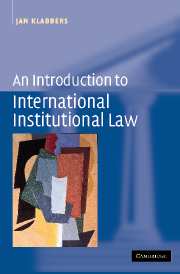Book contents
- Frontmatter
- Contents
- Preface
- Acknowledgements
- Table of cases
- A note on documentation
- List of abbreviations
- 1 Introduction
- 2 The rise of international organizations
- 3 The legal position of international organizations
- 4 The foundations of powers of organizations
- 5 International organizations and the law of treaties
- 6 Issues of membership
- 7 Financing
- 8 Privileges and immunities
- 9 Institutional structures
- 10 Legal instruments
- 11 Decision-making and judicial review
- 12 Dispute settlement
- 13 Treaty-making by international organizations
- 14 Issues of responsibility
- 15 Dissolution and succession
- 16 Concluding remarks: re-appraising international organizations
- Bibliography
- Index
10 - Legal instruments
Published online by Cambridge University Press: 05 June 2012
- Frontmatter
- Contents
- Preface
- Acknowledgements
- Table of cases
- A note on documentation
- List of abbreviations
- 1 Introduction
- 2 The rise of international organizations
- 3 The legal position of international organizations
- 4 The foundations of powers of organizations
- 5 International organizations and the law of treaties
- 6 Issues of membership
- 7 Financing
- 8 Privileges and immunities
- 9 Institutional structures
- 10 Legal instruments
- 11 Decision-making and judicial review
- 12 Dispute settlement
- 13 Treaty-making by international organizations
- 14 Issues of responsibility
- 15 Dissolution and succession
- 16 Concluding remarks: re-appraising international organizations
- Bibliography
- Index
Summary
Introduction
The very idea of international organizations suggests that those entities are capable of performing acts; creating an entity with a separate identity only makes sense (instrumental sense, at any rate), if that entity can subsequently do certain things. In order to do those things, the organization must be able to adopt or create legal instruments.
The scope of acts that organizations may adopt will differ from organization to organization, and is essentially a question of the organization's powers; what is at issue in the present chapter is not so much the scope, but rather the type of acts: what are the legal instruments that organizations may create, and where does their binding character stem from?
The legal nature of instruments of international organizations, and the ways those instruments are created, are in principle determined by what the constituent treaty says. That is, however, not all that can be said, for at least two reasons. One is that the constituent documents of organizations are not always clear on the types of acts (and their nature) to be adopted. Second, even where the constituent document is relatively clear (as in the European Community), practice tends to come up with examples that do not fit the mould of the constituent document.
The topic of legal instruments is perhaps most usefully approached with the help of a variety of questions. First, what types of instruments can be distinguished?
- Type
- Chapter
- Information
- An Introduction to International Institutional Law , pp. 197 - 225Publisher: Cambridge University PressPrint publication year: 2002



